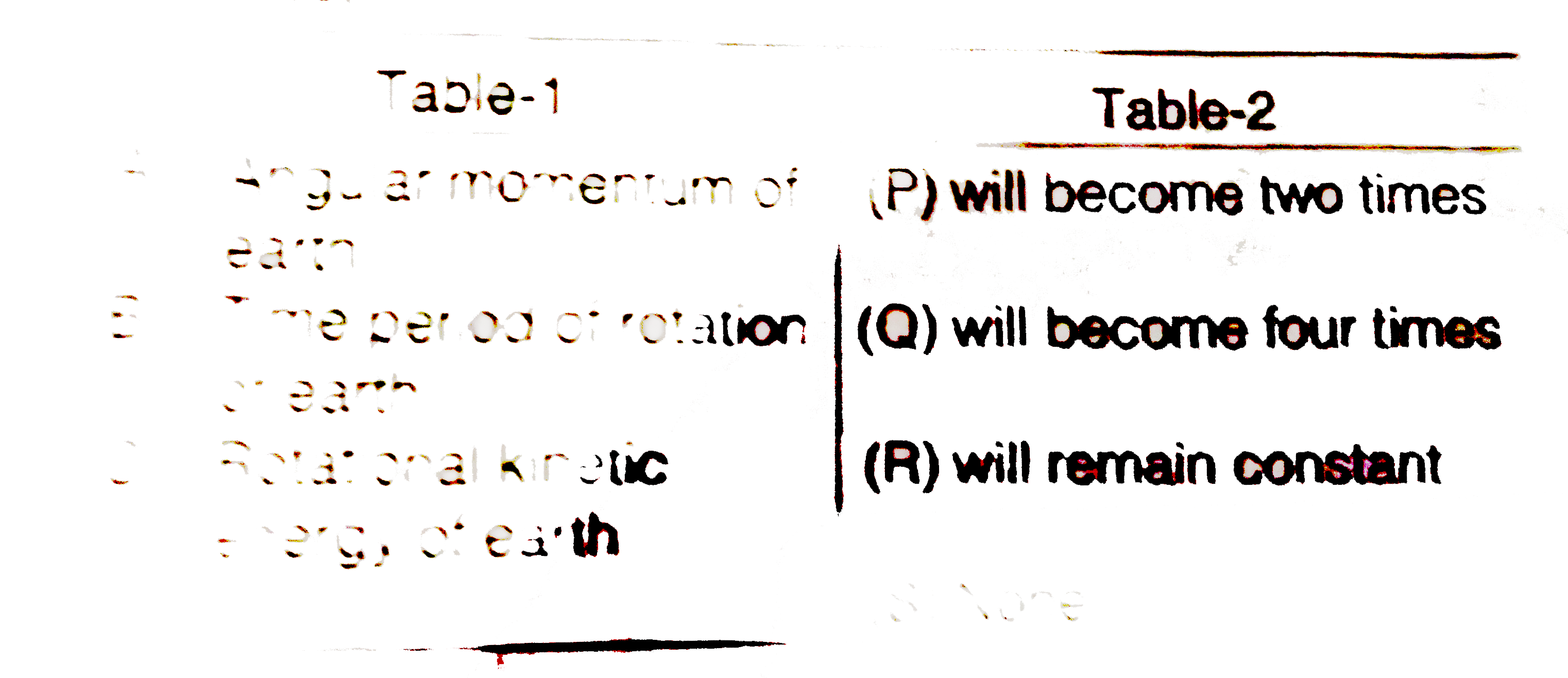If radius of the earth contracts to half of its present value without change in its mass, what will be the new duration of the day?
24 hours
18hours
6 hours
3 hours
To solve the problem, we need to determine the new duration of the day when the radius of the Earth contracts to half its present value while keeping its mass constant. We will use the principles of rotational motion and the conservation of angular momentum.
1. Identify Initial Parameters:
- Let the initial radius of the Earth be r1.
- The initial moment of inertia I1 of the Earth is given by the formula:
I1=25mr21
- The initial duration of the day T1 is 24 hours.
2. Determine New Parameters After Contraction:
- The new radius r2 after contraction is:
r2=r12
- The new moment of inertia I2 is:
I2=25mr22=25m(r12)2=25mr214=I14
3. Apply Conservation of Angular Momentum:
- According to the conservation of angular momentum, the initial angular momentum L1 must equal the final angular momentum L2:
L1=I1ω1andL2=I2ω2
- Since ω=2πT, we have:
L1=I12πT1andL2=I22πT2
- Setting L1=L2:
I12πT1=I22πT2
- The 2π cancels out:
I11T1=I21T2
4. Substituting Moment of Inertia:
- Substitute I2=I14:
I11T1=I141T2
- Cancel I1 (assuming it is not zero):
1T1=14T2
5. Solving for T2:
- Rearranging gives:
T2=T14
- Since T1=24 hours:
T2=244=6 hours
Conclusion:
The new duration of the day after the radius of the Earth contracts to half its present value is 6 hours.
- Let the initial radius of the Earth be r1.
- The initial moment of inertia I1 of the Earth is given by the formula:
I1=25mr21
- The initial duration of the day T1 is 24 hours.
- The new radius r2 after contraction is:
r2=r12
- The new moment of inertia I2 is:
I2=25mr22=25m(r12)2=25mr214=I14
- According to the conservation of angular momentum, the initial angular momentum L1 must equal the final angular momentum L2:
L1=I1ω1andL2=I2ω2
- Since ω=2πT, we have:
L1=I12πT1andL2=I22πT2
- Setting L1=L2:
I12πT1=I22πT2
- The 2π cancels out:
I11T1=I21T2
- Substitute I2=I14:
I11T1=I141T2
- Cancel I1 (assuming it is not zero):
1T1=14T2
- Rearranging gives:
T2=T14
- Since T1=24 hours:
T2=244=6 hours
The new duration of the day after the radius of the Earth contracts to half its present value is 6 hours.
Topper's Solved these Questions
- SYSTEM OF PARTICLES AND ROTATIONAL MOTIONBook:AAKASH INSTITUTE ENGLISHChapter:SYSTEM OF PARTICLES AND ROTATIONAL MOTIONExercise:Assignment (Section - B) Objective Type Questions (One option is correct)
Explore 60 Videos
- SYSTEM OF PARTICLES AND ROTATIONAL MOTIONBook:AAKASH INSTITUTE ENGLISHChapter:SYSTEM OF PARTICLES AND ROTATIONAL MOTIONExercise:Assignment (Section - C) Objective Type Questions (More than one option are correct)
Explore 29 Videos
- SYSTEM OF PARTICLES AND ROTATIONAL MOTIONBook:AAKASH INSTITUTE ENGLISHChapter:SYSTEM OF PARTICLES AND ROTATIONAL MOTIONExercise:Illustration
Explore 4 Videos
- SEMICONDUCTOR ELECTRONICS: MATERIALS, DEVICES AND SIMPLE CIRCUITSBook:AAKASH INSTITUTE ENGLISHChapter:SEMICONDUCTOR ELECTRONICS: MATERIALS, DEVICES AND SIMPLE CIRCUITSExercise:Assignment (Section-D (Assertion and reason))
Explore 5 Videos
- TEST 1Book:AAKASH INSTITUTE ENGLISHChapter:TEST 1Exercise:EXERCISE
Explore 21 Videos
Similar Questions
If the radius of the earth contracts to half of its present value without change in its mass, what will be the new duration of the day?
View SolutionIf the radius of the earth contracts to half of its present value without change in its mass, what will be the new duration of the day?
View SolutionIf the earth, were suddenly contracted to (l/n)th of its present radius without change in its mass, then what will be the effect on the duration of the day.
View SolutionIf earth suddenly contracts to half of its present radius keeping its mass constant what would be the length of the day?
View SolutionIf radius of earth is reduced to half without changing its mass,

View SolutionAssertion : If radius of earth suddenly shrinks to half its present without changing its mass value, then the period of an earth's satellite will not change
Reason : Time period of a satellite does not upon the mass of earth.
View SolutionIf the radius of earth contracts 1/n of its present day value, the length of the day will be approximately
View SolutionIf earth radius reduces to half of its present value then the time period of rotation will become:
View SolutionIf the radius of the earth becomes half of its present value (mass remaining the same ), the new length of the day would be
View SolutionIf earth is 1/4 of its present distance formt he sun, then what is the duration of the year?
View Solution